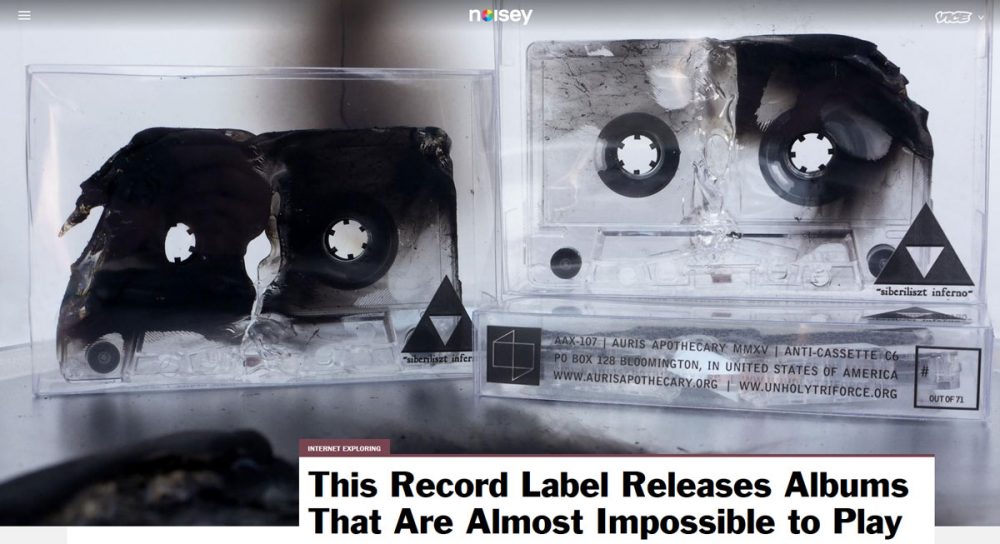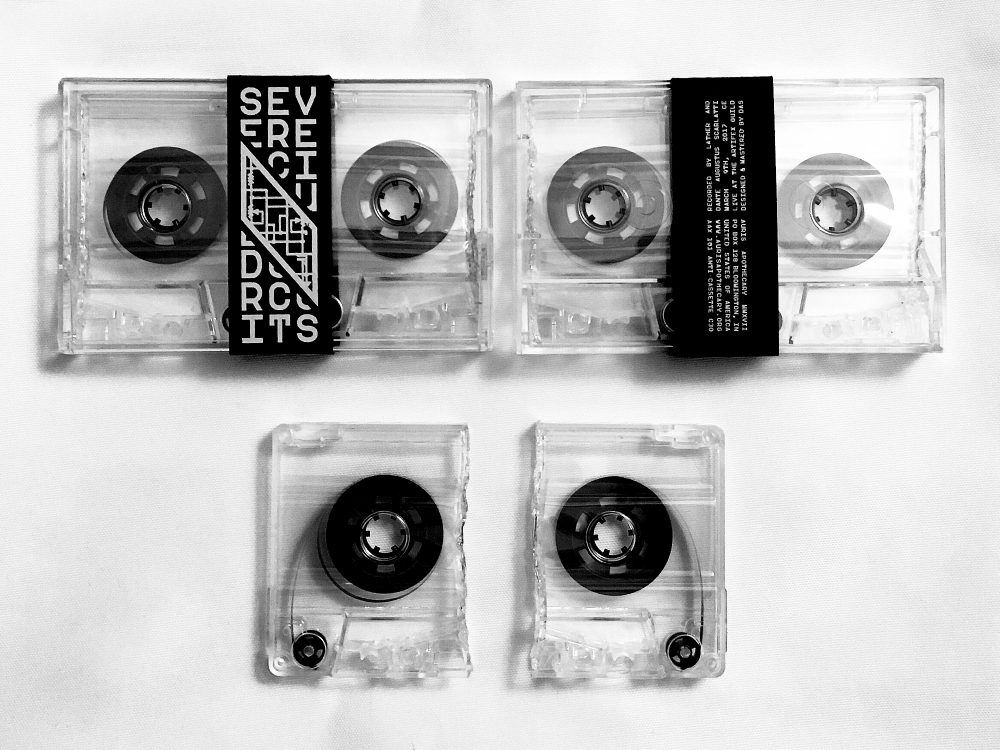
A few weeks back we sat down for a video chat with a journalist from Noisey about our anti-releases, and the article went live yesterday.
As a commentary on music’s increasing ease of availability, Auris Apothecary has released cassettes that are cut in half, CD-Rs covered in herbs, and more.
For a lot of music fans, being a few clicks away from finding pretty much any recording ever made is one of the greatest accomplishments of the new millennium. Others, like Dante Augustus Scarlatti, owner/operator of the label Auris Apothecary, aren't so sure this is a good thing. "Everything nowadays is so instant," Scarlatti says, skeptically. "Things like Spotify, people feel entitled to just endless music, and it's always literally a button push away."
Over the past eight years, Scarlatti (a pseudonym he uses to keep his avant garde hobbies separate from his straight career), his brother (aka Ancient Pine), and a childhood friend who records under the name Pendra Gon, have been countering music's increasing ease of availability by releasing recordings on formats intentionally designed to be difficult—or even dangerous—to play: Albums with ink screenprinted over the grooves. CD-Rs that have been made into air fresheners by having herbs glued all over them. Cassettes covered in shards of actual broken glass. (Scarlatti says his two partners are largely uninvolved in Auris at this point.)

"It never really started as a record label," Scarlatti says. "It started kind of as a weird idea about releasing music that you couldn't listen to or purchase. We never really could manifest a logical way to implement that, which is why it sort of evolved into the label. I guess it was more of an absurdist digital performance art, is what the idea was."
Absurdity—specifically a kind of surly noise-geek strain of neo-Dadaism—runs through all of Auris's "anti-releases." For a recent cassette by LATHER, who constructs noisy arrangements out of piles of broken electronics, they removed the teeth in the tape's reels, rendering it unplayable. A sold-out tape by Unholy Triforce called Some Assembly Required came in the form of a kit that a listener would have to assemble before playing. Scarlatti released one of his own compositions as a length of unspooled magnetic tape.
Other of Auris's pranks have a more destructive bent. On the label's obsessively information-rich website—"We're very much about archiving and documenting everything," Scarlatti says—a description of a "glue record" made by making an imprint of another record with a layer of Elmer's glue boasts proudly of its "extreme surface noise and stylus-destroying lack of predictability." Covering a tape by Eyehategod frontman Mike IX Williams with broken glass was intended to literally embody the danger inherent in his music, although Scarlatti says "I think we got hurt more than the customers did, just in the process of making it."
His own favorite anti-release was the label's first anti-cassette, Unholy Triforce's Sandin' Yr Vagina, which came packaged in a sand-filled case. "If you play it as it, it will destroy your tape player," Scarlatti brags. The pain-in-the-ass mess the tape created was also part of the punchline. "The people at the record store complained that it was leaking on the shelves. Jennifer Allen at The Wire complained that it was all over her desk. It left traces of itself everywhere."
"We don't want you to just put it on your shelf and say, 'Oh look how artistic that is.' We want you to figure it out. That's the whole point."
If you're willing to risk injury to your person or your stereo—or if you can figure out a hack to get a tape's reels to turn without teeth—all of Auris's anti-releases are at least theoretically playable, even the tape that the crew ceremonially melted or a punny split cassette by Scarlatti and LATHER that's literally been cut in half. "Otherwise it's just a random art object," Scarlatti explains, "which is not how we want people to perceive these. We want you to do the work to listen to it. We don't want you to just put it on your shelf and say, 'Oh look how artistic that is.' We want you to figure it out. That's the whole point." (As far as Scarlatti's aware, LATHER is the only person outside of the label's core trio so far who's actually played back every one of their anti-releases.)

Some of the trio's anti-release concepts are too far out—or too dangerous—to be realized. "There are some that we can't do for legal reasons," Scarlatti explains. "We had an idea for one that was inside a guitar pedal that had the capacitors put in backwards. If you put them in backwards in a circuit and you feed them electricity it'll actually explode. We didn't really want to deal with people blowing their finger off."
The ironic punchline to Auris's origin as a joke on the concept of record labels is that somewhere along the way it began to look, anti-releases aside, like an actual record label, with a respectable catalog—running a gamut from melodic sitar jams to unsettling noise deconstructions of vintage porn eight-tracks—on traditional formats and available digitally through Bandcamp. "I love Bandcamp," Scarlatti admits. "I personally believe that any physical release in this day and age is essentially a gimmick. None of it needs to exist. We're all adding shit to a landfill, eventually."
Written by Miles Raymer. Follow him on Twitter.

